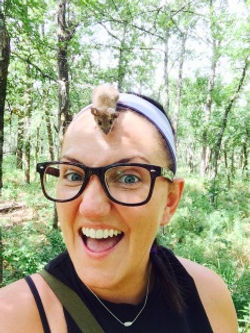McMurry Lab
Current Students
Click photos to enlarge
 |
|---|
 |
 |
 |
Kendall Scarlett: Graduate Teaching Assistant
Great Plains toads, or Anaxyrus cognatus (formerly Bufo cognatus), are the most common toads in the arid southwest. A. cognatus use wetlands for breeding and development, and can reside in the surrounding uplands (where agriculture is more prevalent) following metamorphosis. Consequently, the toads could be exposed to pesticides due to the treatment of crops in surrounding agricultural areas.
Since toads rely on visual stimuli for prey capture, my research focuses on the effect of Organophosphate insecticides, such as Chlorpyrifos, on A. cognatus ability to orient towards their prey (‘prey orientation’). In the future, I hope to perfect a behavioral feeding assay that can be used to test pesticide toxicity in all amphibians.

 |
|---|
 |
 |
 |
KatyAnn Dudley: highschool researcher (now undergraduate student)
I recently started my own project now that Patrick has graduated. I am working with bee hives. Urban bee keeping has been rising exponentially. In the quest to understand what causes Colony Collapse Disorder, I believe some answers could lie in the urban environment and comparing water and wax samples.
For more information, visit my research website:

 |
|---|
 |
 |
 |
Lawrence Adegbule:
Ph.D. Candidate
My research focus on how copper acts as an environmental stressor to amphibians (Xenopus sp) making them loose their lateral lines (neuromasts), and how the frogs recover the lateral lines when the stressor (copper) is removed from the environment.
I also work on how the loss of lateral lines affects the behaviors of frogs.

 |
|---|
 |
 |
 |
 |
 |
Jessica Hoops M.S.
My primary area of interest is population ecology with an emphasis in animal behavior as it applies to conservation. Specifically, I am interested in the way ecological processes and anthropogenic factors combine to influence populations over time.
My current research focuses on the factors contributing to the decline of the endangered American burying beetle (Nicrophorus americanus). My project involves both field and laboratory investigations to identify biological, environment and habitat requirements as well as potential threats to remaining American burying beetle (ABB) populations in Oklahoma. A portion of my thesis work focuses on the ideal feeding and reproduction preferences of ABB, and the behavior exhibited when those particular set of criteria are not available.
contact: jessica.hoops@okstate.edu
